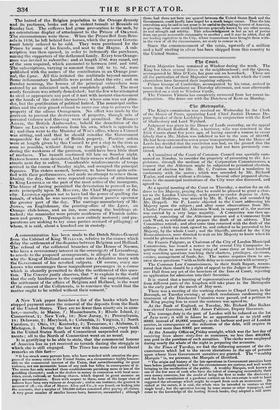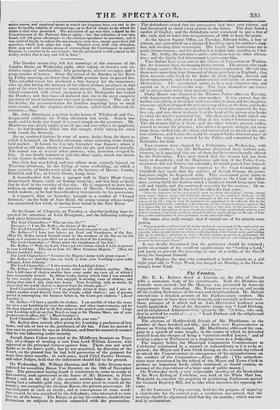Erbe trnpahiL The King's commission was received on Wednesday by
the Clerk of the House of Peers, appointing Lord Chief Justice Denman De- puty Speaker of their Lordship's House, in conjunction with the Earl of Shaftesbury and Lord ‘Vynford.
Judgment was given in the House of Lords yesterday, on the appeal of' Mr. Richard Radford Roe, a barrister, who was convicted in the Irish Courts about five years ago, of having caused a woman to swear falsely that a Mr. Mahon was indebted to her in the sum of 60,000/. He had been sentenced to seven years' transportation ; but the House of Lords has decided that the conviction was bad, on the ground that the person who had committed the perjury had not been previously con- victed.
A Committee of the Court of Common Council was specially sum- moned on Monday, to consider the propriety of presenting to the Le- gislature, through the medium of the Corporation Commissioners, a request that the Aldermen might be subjected to periodical election, instead of election for life. Mr. C. Pearson moved a resolution in conformity with the notice ; which was seconded by Mr. Richard Taylor, and carried without a division. Several other proposed altera- tions in the municipal institutions of the City were also discussed, and agreed to.
At a special meeting of the Court on Thursday, a motion for an ad- dress to his Majesty, praying that he would be pleased to grant a char- ter to the London University, with power to confer degrees in Arts, Law, and Medicine, was moved by Mr. R. Taylor, and seconded by Mr. Heppell. Sir P. Laurie objected to the Court addressing his Majesty upon the subject ; and after some observations from Mr. Charles Pearson and Mr. Alderman Wood, in support of it, the motion was carried by a very large majority. A Committee was then ap- pointed, consisting of the Aldermen present and a Commoner from each Ward, to withdraw and prepare the draft of an address. The Committee retired; and after some time returned with the draft of the address ; which was read, agreed to, and ordered to be presented to his Majesty, by the whole Court ; and the Sheriffs, attended by the City Remembrancer, were directed to wait on his Majesty to know when he would be pleased to receive it.
Sir Francis Palgrave, as Chairman of the City of London Municipal Commission, has issued a notice to the several City Companies re- quiring them to answer a long string of some three or four hundred very searching questions touching their charters, privileges, ejections, estates, management of funds, &c. The notice requires them to an- swer these questions "with as little delay as is consistent with accuracy."
The Common Law Commissioners, in their Sixth Report, recom- mend that there should be a right of appeal to the Judges at Westmin- ster Hall from any act of the benchers of the Inns of Court, rejecting an application for admission into their Societies.
It is stated that a meeting of representatives of the Dissenting body from different parts of the kingdom will take place in the Metropolis in the early part of the month of May next.
There was a meeting of the working classes in Chapel Court, in the Borough, on Tuesday evening; at which resolutions condemning the treatment of the Dorchester Unionists were passed, and a petition to the King praying him to remit the sentence was agreed to.
At the Bank of England, on Tuesday, Mr. Richard Mee Raikes was elected Governor, and Mr. James Pattison, Deputy Governer.
The tonnage-duty in the port of London will be reduced on the 1st of June next ; it will in future be so apportioned as to yield only 8000/. instead of 48,0001. annually ; as the harbour and port of London service, in consequence of the reduction of the debt, will require in future not more than 8000/. per annum.
At the Annuity Office on:Friday sennight, which was the last day of receiving lives above sixty-five as nominees, no less than 400,0001. was paid in the purchase of such annuities. The clerks were employed during nearly the whole of the night in preparing the accounts.
In the Times of Tuesday, we find the following account of the cir- cumstances which led to the recent alterations in the age of persons upon whose lives Government annuities are granted. The "wealthy Marquis" is, we presume, the Marquis of Hertford. "The origin and history of the late operations in Government annuities have been before partially noticed ; but the circumstances are curious, and well worth bringing to the recollection of the public. A wealthy Marquis, well known as one of the few men of rank who have the talent of managing successfully their own money concerns, has the credit of being the first to make the discovery ; and the hale constitution of a gardener resident on his own estate is said to have suggested the advantage which might be reaped from such an investment. He staked at the outset, It is said, the whole sum he intended to venture on this single head ; but the operation having by some means or other transpired, and come to the knowledge of the leading Scotch banks, they adopted a still more secure course, and employed agents to search the kingdom from (me end to the other for healthy subjects of advanced age, up to that of ninety years, which the tables at that time permitted. The maximum of age was then it duced by the Commissioners of the National debt to eighty ; but this reduction it was soon found, still left great advantages to the cautious speculator in annuities ; and it was resolved finally to reduce the maximum to s;xty-five, except upon bona fide annuities, which took place last week. Whether, even with that alteration, there may not still remain means of overreaching the Government in annuity bargains, is a matter to be ascertained ; but the persuasion is still reneral in the money market that it may and will be done."





















 Previous page
Previous page